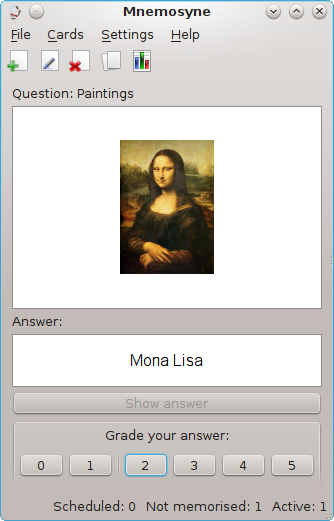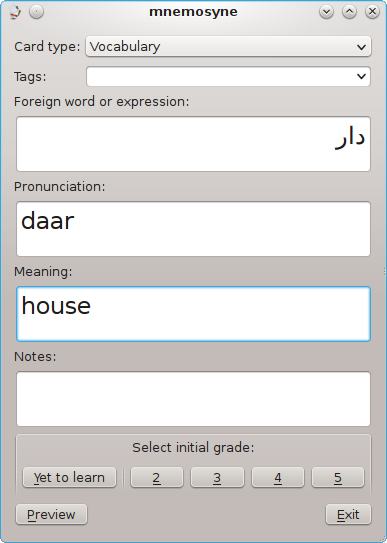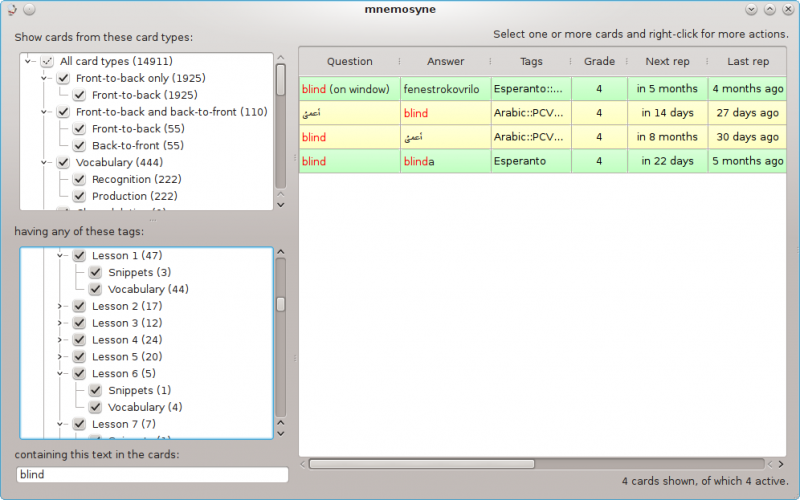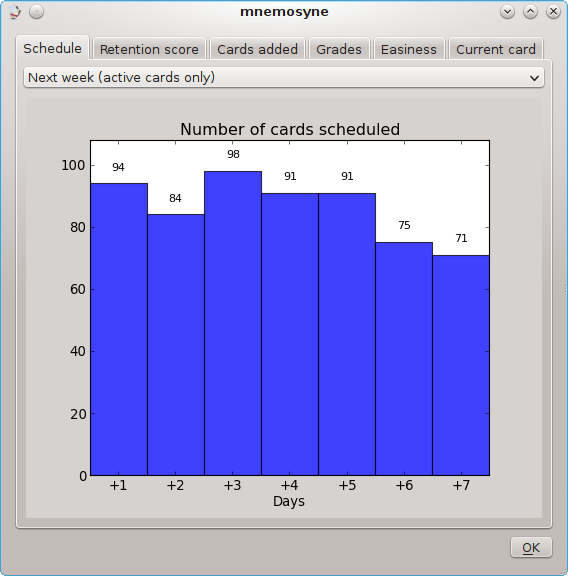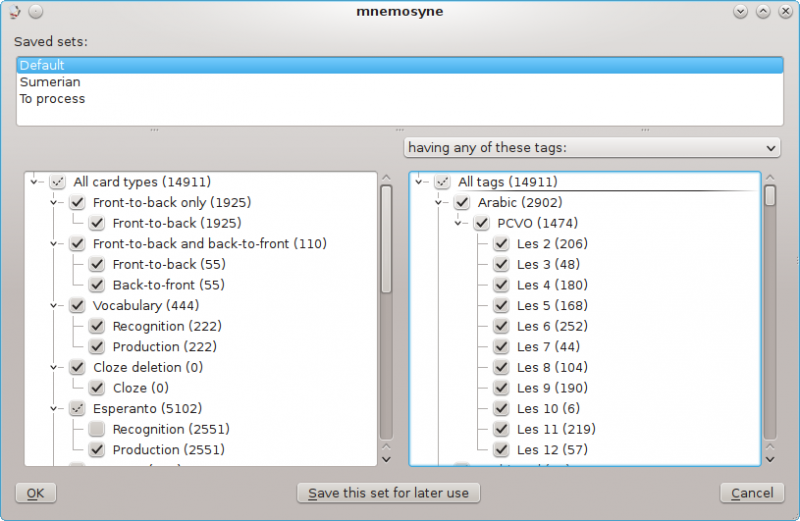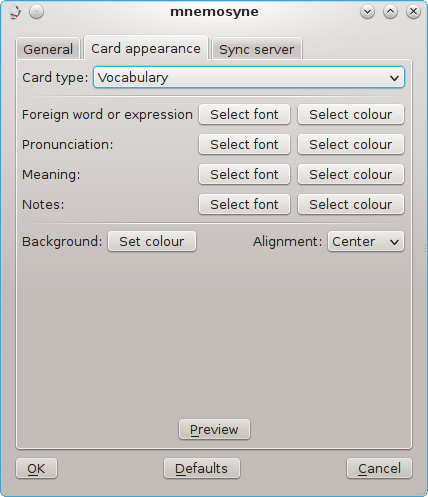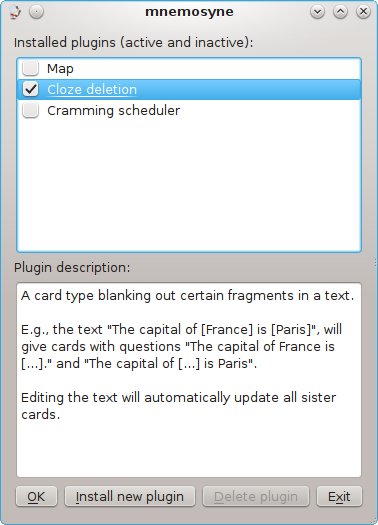- Bootable USB Creators
- Miscellaneous Software
- IDE Software
- GIS Software
- VPN Software
- Database Management Software
- Data Recovery Software
- CAD Software
- Web Browsers
- PDF Editors
- Browser Plug-ins
- Video Playing Software
- Programming Languages
- Android Emulators
- SSH Client Software
- File Managers
- Download Managers
- Disk Formatting Software
- Video Editing Software
- Disk Space Analyzers
- Image Editing Software
- 3D Modeling Software
- Application Server Software
- Mouse Cursor Software
- Remote Desktop Software
- File Synchronization Software
- Messaging Software
- Digital Audio Workstation Software
- Audio Mixing Software
- Rescue Disk Software
Mnemosyne 2.11
| מחיר | חינם |
| גִרְסָה | 2.11 |
| תאריך הוצאה | November 14, 2023 |
| מוֹצִיא לָאוֹר | Mnemosyne Project - https://mnemosyne-proj.org - Belgium |
| תיאור המוציא לאור | |
Welcome to the Mnemosyne Project
The Mnemosyne Project has two aspects:
- It's a free flash-card tool which optimizes your learning process.
- It's a research project into the nature of long-term memory.
We strive to provide a clear, uncluttered piece of software, easy to use and to understand for newbies, but still infinitely customisable through plugins and scripts for power users.
Efficient learning
Mnemosyne uses a sophisticated algorithm to schedule the best time for a card to come up for review. Difficult cards that you tend to forget quickly will be scheduled more often, while Mnemosyne won't waste your time on things you remember well.
Memory research
If you want, anonymous statistics on your learning process can be uploaded to a central server for analysis. This data will be valuable to study the behaviour of our memory over a very long time period. The results will be used to improve the scheduling algorithms behind the software even further.
Features
Mnemosyne aims to be a user-friendly flash card program, with a clean, deceptively simple interface that does not require you to wrap your head around complicated concepts before you can start using it. At the same time, under the hood it is very powerful, and its architecture allows infinite extensibility and customisibility through plugins and a scripting API, for the benefit of power users.
Cards with rich content
Cards can contain pictures, sounds, movies,.... Since each card is in effect a tiny webpage, even funky stuff like Javascript and Flash is supported. Also, Mnemosyne can integrate with Latex, to render your formulas. It goes without saying that Unicode is fully supported too.
Powerful card types
From the information below, Mnemosyne will generate two sister cards: a so-called 'recognition' card asking you to come up with the translation of the foreign word, and a 'production' card asking you to come up with the foreign word. Of course, if you edit the material on the card, both cards will be automatically updated.
Flexible card browser
You can easily display precisely the cards you are interested in, sort by creation date or difficulty,.... Note that you can add tags to each card to organise them. Cards can have multiple tags, and you can organise tags in a hierarchy. The different colours in each line in the browser are the background colours the user has chosen for different cards.
Graphical statistics
Mnemosyne comes with a full set of statistics to illustrate your learning process: past and future schedule, retention score, cards added,....
Full control over which cards to study
Sometimes you don't want to study all your cards at the same time, but only focus on a subset of them. You can easily select which cards to study based on tags or card type, and save this set for future use. The system is very flexible, as cards can belong to more than one set, and the sets are automatically updated if you e.g. edit a card to add or remove a certain tag.
Configurable
Mnemosyne offers many configuration options, e.g. full control of the appearance of each element in your cards.
Extensive plugin architecture
Mnemosyne is conceived in such a way that every part of the program can be extended or changed, even core parts like the scheduler and the database system. Mnemosyne comes out of the box with a number of plugins, like those of a cloze card type (to selective hide several parts of a text) and a cramming scheduler (e.g. to drill your cards before an exam without affecting the default scheduling). Thanks to the plugin mechanism, we can keep the main interface of Mnemosyne uncluttered, yet still offer complete customisibility to power users.
Sync protocol
Mnemosyne contains a built-in sync mechanism to allow to sync e.g. your laptop to your desktop machine. It is fully bidirectional, i.e. you can add new cards on your desktop and review old cards on your laptop, and both sets of changes will be merged seamlessly. Can sync with more than 1 partner. Optimised for speed and memory usage on mobile devices.
